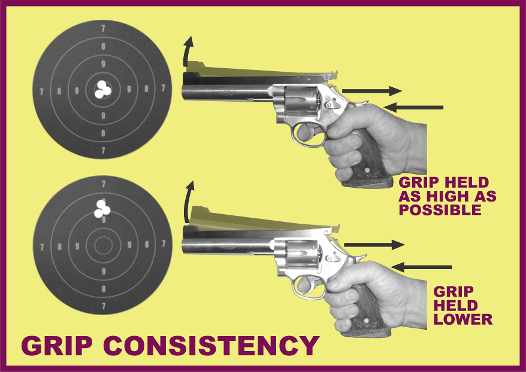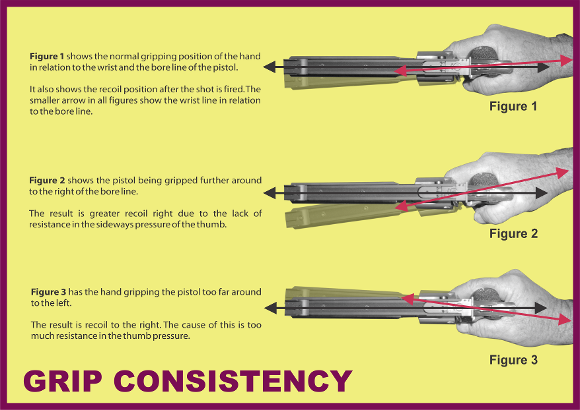
What does it all mean? When firing a pistol whether being a one handed wobbly shooter (ISSF) or a real man's shooter with two hands, a consistent grip is paramount when striving for consistent groups. If we were to put a pistol in a machine rest using a certain pressure on the machine spring we would achieve a group. Doesn't matter where they are at this stage.
If we use the same ammo but tighten the machine spring, the impact point would change due to added resistance to the muzzle "jump" of the pistol. If we apply this practice to the grip of the hand and fire a number of shots holding the grip with "X" pressure then a group would form. If we then fire a number of shots with "XX" pressure, the impact point will change. Both grip pressures will give you the same size group but in a different position on the target, either higher for a weak grip or lower for a very firm grip.
This is fine if the consistency is the same throughout the match or series but changing pressure during a match or series can lead to group shifts that you may not realise the cause of. Also the position of the hand on the grip. Coaches always advocate that the hand should be as high as possible in the grip and fingers placed around the front part of the grip to form a vice like grip.
But what if one series is fired with the hand held high in the hand and the next series the hand is slightly lower in the grip? This will alter the recoil characteristics of the pistol like in the machine rest and cause group shifts. Not only high and low positions on the grip but having the hand too far around the grip or not far enough around so the recoil is coming straight up the arm and into the shoulder.
Again, each hand position will give you a "group" but if this hand position changes slightly from shot to shot and series, it will cause group shifts all over the target. Take an event such as Service/wa1500. Prone position is usually a central group. Sitting/kneeling is where the groups tend to change slightly, sometimes high. This is because of the change in grip pressure and recoil is generally greater in sitting/kneeling as there is little support for the pistol such as prone and the barricades.
The diagrams below show the likely group shifts and what may cause them.


Make a free website with Yola
